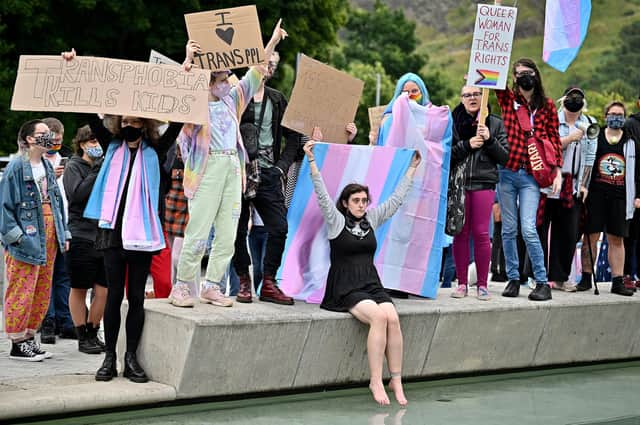Gender Recognition Reform Bill: On December 21, Scotland can take big step forward for transgender rights – Vic Valentine


A reminder: the Gender Recognition Act is the law that allows trans men and trans women to be legally recognised as who they are, and update the sex on their birth certificate. Trans men, who will have had an ‘F’ on there when they were born, can update it to an ‘M’, and trans women from an ‘M’ to an ‘F’. Without doing this, at important moments of their life they have to show something that profoundly contradicts their identity, or it may even mean that when they die their death certificate does not reflect how they lived their life.
Because of the current intrusive requirements for, and barriers to, updating a birth certificate, lots of trans men and women are stuck with one that does not reflect who they are. This can cause real problems. A young trans woman may apply for a job for the first time at 17, and be offered it and excited to start. However, she may then need to show her birth certificate to HR, with her old name and that ‘M’ displayed. Suddenly, the job offer disappears.
Advertisement
Hide AdAdvertisement
Hide AdOr a trans man and his partner may decide to marry, and excitedly start planning. But realising that he’ll need to show his birth certificate to give notice, he and his partner may delay their plans, not wanting to start their life together in a way that is out of step with how he lives his life, and how they see themselves as a couple.
The hurdles that must be cleared under the current law are high. You must be 18 or over to apply. You must provide a psychiatric diagnosis with your application. This is an issue for two significant reasons.
The first is that currently, to access an NHS appointment for this diagnosis and indeed wider healthcare they need, many trans people in Scotland will have to wait over four years. Secondly, it means that having who you are recognised in law relies not on your own application, but on the sign-off of a psychiatrist. This is an outdated approach to recognising trans people, that has been described as “abusive” by international human rights experts.
You must also provide a detailed report of personal medical choices you have made. This is despite the fact that no medical treatment whatsoever is required to be eligible to update your birth certificate, making this deeply unnecessary and intrusive.
There are also significant hidden costs. Updating your birth certificate is the last thing a person does as part of the steps they take to live their life in a way that reflects who they are – it grants recognition of that. You have to provide evidence that you’ve been living this way for at least two years.
Often this requires submitting your already updated identity documents – so people may get a passport they can barely afford, or a driving licence they don’t need, for evidence. If you can’t bear to wait the four years to access NHS healthcare and a diagnosis, you may be forced to spend hundreds of pounds going private.
You can also only be legally recognised in Scotland as a man or woman. For many trans people, myself included, neither of these match up with who we know we are. We describe ourselves as ‘non-binary’: a person where neither the terms man or woman quite fit – we instead know ourselves to be somehow outside, nearby, or not either of these things – but we must navigate the world using a birth certificate (and indeed all ID) that says we are one or the other.
The bill that MSPs will vote on will address many of these issues. It is not perfect – there will continue to be no legal recognition for non-binary people – but it would be a big improvement. It will mean Scotland has a more simple, fair and modern system, like those already used in more than 30 places around the world. Systems that remove the lengthy time delays, medical evidence, and which place trans men and women at the heart of making such a personal decision.
Advertisement
Hide AdAdvertisement
Hide AdWhat this bill is all about has often been lost in the noise around it. Because when it really comes down to it, it is about the private, personal lives of trans people. It is not about the services or spaces we use or medical choices we make – all things that are determined by other laws, or by healthcare providers, and which aren’t affected by this bill or determined by what’s on your birth certificate.
But it is about the discrimination and harassment we might face when trying to navigate the job market – with no choice but to let any prospective employer know we are trans. About the disappointment, embarrassment and worry we might face trying to take a big step in life with a partner – our excitement about a marriage or civil partnership squashed. About the fear and anguish we might feel as we reach the end of our lives – uncertain that the record left of us will be one we’d recognise. Moments, milestones and memories that mean the world to us, but that make little impression and have no impact on others, unless they’re very close to us.
We should all be able to live as our true selves. To have it recognised at times that matter. Our current law makes that something that’s too far away for too many trans people in Scotland. I hope that in a few weeks’ time, we can say we’ve made significant progress towards this being as true for trans people as it should be for everyone.
Vic Valentine is manager of Scottish Trans
Comments
Want to join the conversation? Please or to comment on this article.